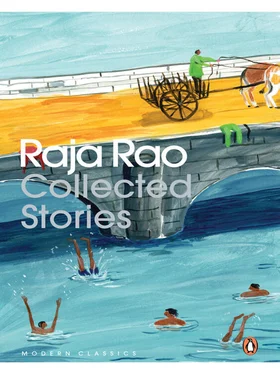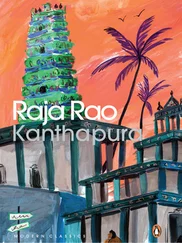Raja Rao - Collected Stories
Здесь есть возможность читать онлайн «Raja Rao - Collected Stories» весь текст электронной книги совершенно бесплатно (целиком полную версию без сокращений). В некоторых случаях можно слушать аудио, скачать через торрент в формате fb2 и присутствует краткое содержание. Год выпуска: 2014, Издательство: Penguin, Жанр: Классическая проза, на английском языке. Описание произведения, (предисловие) а так же отзывы посетителей доступны на портале библиотеки ЛибКат.
- Название:Collected Stories
- Автор:
- Издательство:Penguin
- Жанр:
- Год:2014
- ISBN:нет данных
- Рейтинг книги:5 / 5. Голосов: 1
-
Избранное:Добавить в избранное
- Отзывы:
-
Ваша оценка:
- 100
- 1
- 2
- 3
- 4
- 5
Collected Stories: краткое содержание, описание и аннотация
Предлагаем к чтению аннотацию, описание, краткое содержание или предисловие (зависит от того, что написал сам автор книги «Collected Stories»). Если вы не нашли необходимую информацию о книге — напишите в комментариях, мы постараемся отыскать её.
Collected Stories — читать онлайн бесплатно полную книгу (весь текст) целиком
Ниже представлен текст книги, разбитый по страницам. Система сохранения места последней прочитанной страницы, позволяет с удобством читать онлайн бесплатно книгу «Collected Stories», без необходимости каждый раз заново искать на чём Вы остановились. Поставьте закладку, и сможете в любой момент перейти на страницу, на которой закончили чтение.
Интервал:
Закладка:
But one night, however, a few years later she had a real vision. In three days, it revealed, a sadhu would come to initiate her, and she would then become a true devotee of the Lord. Indeed, as foretold (and she had told no member of her family of this vision, except it be to her father, whom she revered), a handsome-looking sadhu, hardly thirty-five years of age, came into the house. He was a man from the South, and was, so he explained, on his way to Badrinath and Kedarnath in the Himalayas, and then finally he would come down and go, he would, to the holy city of Benares. ‘Passing by this street, Mother,’ he said to Ramaben, ‘I could see some sincere soul was living here. Is there anyone living in this house who’s deeply devoted to the Lord?’ Sudha, who was inside, knew this was the saint whose arrival she was anticipating, and throwing away her bedsheet, and coming out, fell prostrate at his sacred feet. ‘Too long have I waited for you,’ said the Sadhu. ‘Where have you been?’ ‘You, Lord, know more than I do,’ she whispered back in reply. The Mother could not understand. But Sudha suddenly remembered, so she explained later, all of her past life. A large house, somewhere in Kathiawar, or was it elsewhere? They spoke a strange tongue. She was forty or forty-five years of age, and had raised four or five children. And they were gay and prosperous, horses in the stables and elephants in the yard — some men went to the wars, others played cards or roamed with women, but her husband suddenly died and she then knew she loved him more than she did God Himself. Her husband was, though a prince and real Rajput, the worshipper of a great Guru. For every sneeze and scratch he would run to the ashram of his Guru which was on the marble cliffs of our beautiful Narbada. She did not care for God. But once her husband had departed, her one thought was he, and her union with him. How noble it was in the old virtuous days: you could be burnt with your spouse, your Lord. It’s a pity the British came and stopped it all. She went back to the same ashram on the Narbada, But the Guru had, by now, given up his body. His disciple who had succeeded him gave her a secret mantra. She repeated the mantra again and again and vowed she would find God now that she had no husband. She died however without seeing God and not even having an intimation of His Holy Presence. She died beautifully though (she could now see her own funeral procession) — people throwing flowers on her bright, elderly, saintly figure.
And she was then born to Ranchoddoss, and when the time came, the past life returned too, if not tell me why this hatred of marriage? Her Lord of one life was the Lord of all lives. And there he was. He knew. She ‘saw’. And he stayed on in the house, and in a way the whole house became a roundabout for him — the elders said even the business was suffering because of this Sadhu. After three months, on an auspicious day Sadhu Sunderanandaji (for that was his name) initiated her with the full consent of Ranchoddoss and Ramaben, to sannyas. She put on the white sari and a few days later with the sadhu, she departed for the Himalayas. Her family did not weep — they were too grave to weep (except the mother, who said, “Lucky I am to have borne you, my daughter, but Lord give me peace of mind. I cannot live one day without my daughter’). However the household moved on as before except that Ranchoddoss began to look more and more like his daughter, talk like his daughter, and he also began to fast and festivate for this and that. The business nevertheless prospered. His two sons Govinddoss and Vithaldoss were honest, devout and money-minded. Now and again when the business was not too bright, he would open to Vishnu Purana or the Bhagavatham, and read chapter after chapter of one of these sacred texts.
One day it would be about Krishna and the gopi s, from the Bhagavatham, or of the Goddess Laxmi, rising out of the milky ocean on a stalk of blue lotus, and this from the Vishnu Purana, But the story he loved most of all was of that king who having lost interest in his splendorous world, suddenly comes upon a deer with its young in the forest, and he brought the little one home, petted her and fed her, but when he died he was, of course born a deer, for remember you are reborn as your last thought be. And again, as a deer he was so wise and sparse of need, for he well remembered his past life, as king, but was born again as a man, and a Brahmin this time, a Brahmin fat and big, uncouth and repulsive, saliva dripping down his cheeks, and destiny made him, though a Brahmin by birth, a palanquin bearer of King Suvera. But so indifferent was he to everything, and bore the palanquin so unequally paced the other palanquin bearers shouted at him again and again, when finally the king himself jumps out of his palanquin, and asks in royal ire, ‘Who are you? And why do you do this to me?’ To which the palanquin bearer Brahmin replied: ‘Look, Sire, I am fat and strong, uncouth, saliva running down my face. Look, look at me, but tell me, King, am I my face, my limbs, my nose that drips this snot, am I, I? Tell me truly, who am I?’ Then he told the king of his past lives, which he remembered so well, and of the king who loved the little deer so, and of the deer he was born as, and again of the Brahmin he is now. ‘Who indeed am I?’ And boldly asked of King Suvera: ‘And how shall I denominate you, Sire? Are you your body? Who are you, king? And, what, pray is a king? Tell me, please, what is an object? Is this a palanquin? Of what wood however is it made? Do you know its name, and whence it came, and where sawed out, fixed, and made into a palanquin?’ And the Brahmin finally said, ‘Just as the universally distributed air, going through the holes of a flute, makes for the variegated melodies, with sariga , sariga notes and all that, yet all this is but one piece of bamboo. There is no I, there is no you.’ And so saying, he suddenly saw within himself then and there as if jumping out of his person — thus, he was forever freed from birth and rebirth. And so too did the king. Ranchoddoss told this story again and again to himself. He related this story to his wife, Ramaben. ‘The truth is just that, Rama.’ But she could find no satisfaction in such legendary talks. After all she was a mother. And how can a man, any man, understand that?
Some years went this way. However, Ramaben could never console herself for the loss of Sudha. When sorrow grows it can grow big as a fruit in the belly, and even pushes out thorns as a cactus does. She suffered as no one had seen people suffer. The doctors gave her radium treatment, but she died one morning, however, very peacefully. She would at least have a better life next time, decided Ranchoddoss, wiping his tears when he came back, with his brothers and sons, from the cremation grounds. One has only to get there, where there is neither birth nor evil death. Is that not so, Sudha?
And now that the two boys — Govinddoss and Vithaldoss — were married, and the elder brother and younger, Bhagavandoss and Ramadoss were both alive and prosperous, Ranchoddoss left home to seek his daughter. And he found her without difficulty in Benares. You can ask any Brahmin in Benares, where anyone else is, and somehow they will tell you, or take you to another who will tell you, all you want to know, where your daughter is, or your uncle. And he will even tell you, not only of all your ancestors, father, grandfather, and great-grandfather, their names all written down in their family documents, but also of your jewellery shop on Girgaum Road, and of Panduranga Vithala, who appeared to Rukmabai, because she could not go to Pandharpur, in addition to the flute, white cow and peacock crown. All, all we know. Such indeed the Brahmins of Benares. For, remember, what you find not bad and good in Benares, you know you will see no such truths any elsewhere on earth. Here, in this most sacred city, I can tell you, whoever wants to hear that in final wisdom, there is neither virtue nor vice, for both burn like those pyres on the ghats, equally — to ash. Don’t you understand this? Even the curs here know it.
Читать дальшеИнтервал:
Закладка:
Похожие книги на «Collected Stories»
Представляем Вашему вниманию похожие книги на «Collected Stories» списком для выбора. Мы отобрали схожую по названию и смыслу литературу в надежде предоставить читателям больше вариантов отыскать новые, интересные, ещё непрочитанные произведения.
Обсуждение, отзывы о книге «Collected Stories» и просто собственные мнения читателей. Оставьте ваши комментарии, напишите, что Вы думаете о произведении, его смысле или главных героях. Укажите что конкретно понравилось, а что нет, и почему Вы так считаете.












